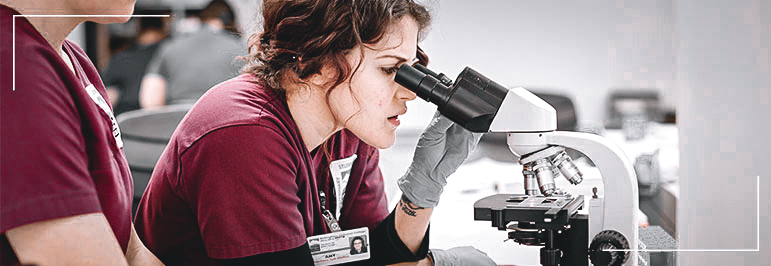Veterinary Technician

Veterinary Technician - Veterinary Assistant
Turn your love of animals into a satisfying career! BTC’s Veterinary Assistant Certificate program is ideal if you have an aptitude for math and science, and are interested in being a valuable part of the veterinary care team. You’ll work with animals and people, in a job that is different every day.
With BTC’s high quality education and hands-on training, you’ll gain the valuable skills needed now by veterinary hospitals, surgery centers, specialty care providers, zoos, and wildlife facilities.
Note: BTC has not made a determination that the Veterinary Technician curriculum meets educational requirements for licensure/certification outside of Washington State. We encourage students who plan to work out-of-state to check relevant local licensure/certification requirements.
Employment Information
Data are provided on a program (not credential) level
85% BTC graduate placement rate1
$43,548 starting annual wage2
$50,460 average annual wage2
$53,883 potential annual wage2
Entry Information
When Can I Start?
Students interested in the Veterinary Technician program should apply to the college and contact Admissions at 360.752.8345 or at admissions@btc.edu for assistance with getting started at BTC. A college application and your score on assessment testing and/or previous transcripts will determine where you begin your course sequence.
Admission requirements for Veterinary Assistant are the same for Veterinary Technician
This program typically admits students into first quarter core courses in the fall. Registration for Fall Quarter starts halfway through Spring Quarter. We will be accepting new students in the Fall of 2025.
Program-ready students are invited to register for Veterinary Assistant courses. Students who have completed ALL prerequisite requirements before the start of first quarter core courses will be allowed entry based on the order in which they register.
There is no separate admission process or application for this program.
What are the Minimum Entry Requirements?
A completed college admissions application and placement in English and Math. BTC uses a Guided Self-Placement process to help you choose the best starting point for your English and Math courses. Your selections will determine whether you begin with program coursework or complete prerequisites classes first. To get started or for help determining your English and math placement, contact the Outreach department at Outreach@btc.edu
ATI Test of Essential Academic Skills (TEAS) v.6
Applicants must score at the "BASIC" level or higher in each of the four areas on one transcript. See the ATI Test of Essential Academic Skills handout for more information about this entrance assessment.
Having trouble scheduling your ATI TEAS assessment? More options are available! Email the Assessment Center: assessment@btc.edu
Evidence of High School graduation or equivalent submitted to BTC Admissions Department.
Students must be 18 years or older before beginning program core courses.
Early Program Course Requirements
Completion of the following courses with a minimum grade of 2.0 (C) or higher in each course:
- English Composition 1 (ENGL& 101)
- Math in Society (MATH& 107) or any MATH course from the AAS-T alternative course list will be accepted.
- Interpersonal Communications (CMST& 210) or General Psychology (PSYC& 100)
- General Biology with Lab (BIOL& 160)
- Introduction to Chemistry (CHEM& 121) preferred, will accept other courses in the following fields: BIOL, CHEM, OCEA, ZOOL
- Intro to Veterinary Technology (VETT 100)
ONLY for students who are transferring prior credits to BTC: Official transcripts documenting prerequisite course completion must be submitted and evaluated before registration.
Clinical Placement Requirements
AFTER admissions acceptance into the program and prior to beginning program classes students must submit proof of all Clinical Placement Requirements.
-
This program requires a criminal history background check prior to attending the clinic practicum. Criminal History Background Check Information Sheet
Veterinary Technician Informed Acknowledgment and Consent to Hazards and Risks
Notice About Marijuana Usage
Students who test positive for THC (marijuana, including prescription marijuana) will not be allowed entrance to Nursing and Allied Health programs with clinical components. Drug screening is a requirement of our clinical partner agencies. Although private recreational and medical use of marijuana is legal in Washington state, our clinical partner agencies are governed by federal laws, and marijuana is a prohibited substance at the federal level. If your final drug test results are positive, you will be ineligible to participate in the program that year and will be allowed to reapply to the program 12 months from the date of the positive test.
What are My Next Steps?
Classes
Total Program Credits: 62
Quarter 1
VETT 101 Veterinary Nursing I 4 CR VETT 102 Veterinary Anatomy & Physiology I 5 CR VETT 103 Veterinary Medical Terminology 3 CR VET 120 Medical Dosages and Calculations 3 CR VETT 201 Mentorship Lab I 2 CR Quarter 2
VETT 104 Veterinary Nutrition I 3 CR VETT 105 Learning for a Lifetime 2 CR VETT 106 Microbiology, Virology, & Mycology 3 CR VETT 107 Small Animal Parasitology 4 CR VETT 108 Radiology I 4 CR VETT 202 Mentorship Lab II 2 CR Pre-Program
ENGL& 101 English Composition I 5 CR MATH& 107 Math in Society 5 CR BIOL& 160 General Biology with Lab 5 CR CHEM& 121 Intro to Chemistry 5 CR PSYC& 100 General Psychology 5 CR OR CMST& 210 Interpersonal Communications 5 CR VETT 100 Intro to Veterinary Technology 2 CR
Program Outcomes
After successfully completing the Veterinary Assisting Certificate, students will be able to:
- Care for animals in a manner that is safe for both animals and humans;
- Promote public health;
- Accept the responsibilities of his/her profession, to provide compassionate, competent, ethical care in a professional, conscientious manner;
- Pursue lifelong learning to advance his/her knowledge of veterinary care;
- Understand normal anatomy, physiology and behavior of health for the species studied;
- Understand and participate in the process of diagnosis, therapy and prevention of animal disease;
Employment Outlook
Veterinary technicians typically conduct clinical work in a private practice under the supervision of a veterinarian, performing various medical tests in a laboratory setting along with treating medical conditions and diseases in animals.
They may work in research facilities, where they may administer medications orally or topically, prepare samples for laboratory examinations, and record information on an animal’s genealogy, diet, weight, medications, food intake, and clinical signs of pain and distress. They may also work with other scientists in medical-related fields such as gene therapy and cloning. Other opportunities exist in biomedical research, wildlife medicine, the military, livestock management, education, or pharmaceutical sales.
Criminal convictions may restrict or prevent student participation with internships and employment in this industry.
Faculty & Support

Lisa Dzyban
Veterinary Technology
Ashley Meadows
Veterinary TechnicianContacts
If you have questions about this program or want help with the admissions steps to Bellingham Technical College, please email outreach@btc.edu.
Current students wanting academic planning and support, can connect with the program Instructor(s) or email NursingAlliedHealthNav@btc.edu
